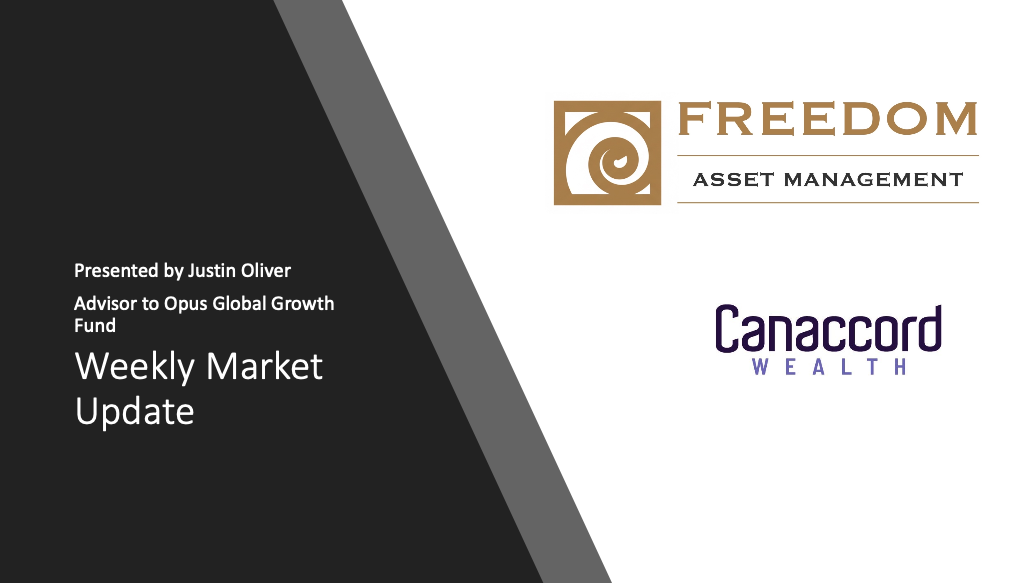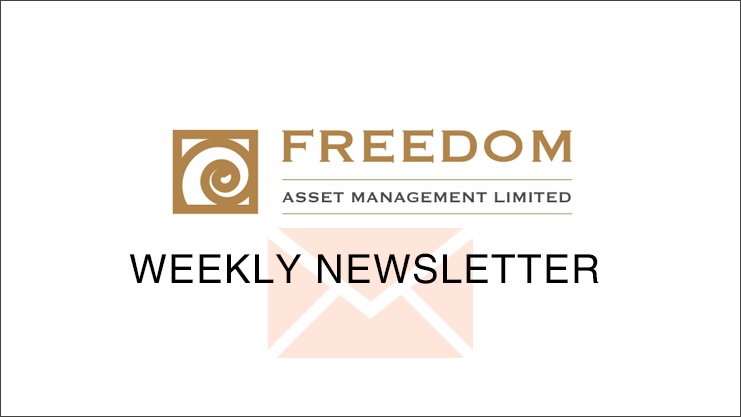Weekly Newsletter
Freedom Calls: 28/7/25, “The Laffer Curve strikes again.....and Monsieur Macron tries ‘bold and clever’ in the Middle East”
by
Freedom Asset Team
July 28, 2025
7 Minutes

Freedom Calls: 28/7/25, “The Laffer Curve strikes again.....and Monsieur Macron tries ‘bold and clever’ in the Middle East”
From the team at Freedom Asset Management
++ Hot off the press, we see that the EU has just agreed a tariff deal with the US at a rate of 15%. That is broadly good news, because it takes uncertainty off the table, although the deal is not as good as many in the EU were hoping for, especially German manufacturers. We will analysis this and the other key deals next week. ++
The Laffer Curve strikes again… in the UK
Arthur Laffer was an American economist in the 1970’s. At that time, the prevailing view amongst politicians was that if you increased income tax rates, you would raise more tax revenue. He made the case to Gerald Ford’s US administration in 1974, that this simplistic and hopeful analysis was wrong. Apparently, Mr Laffer scribbled his curve on a napkin, but simply put, a tax rate of 0% raises no tax revenues in the same way as a tax rate of 100% also raises no revenues – in the latter case because nobody bothers working any more.
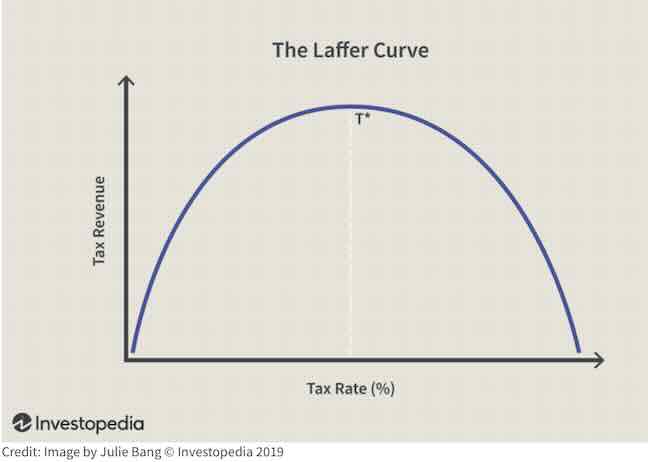
Source: Investopedia
Laffer’s view was also that if you were to take money away from businesses in the form of higher taxes, those businesses would be less willing to invest. Businesses (and people) would move overseas, at best - or lose their incentive to work, at worst. If you look at the chart above, the skill is to maximize “T*”, the rate at which you optimize total tax revenues.
In 1979, when Margaret Thatcher came to power in the UK, she famously embraced Mr Laffer’s theory, reducing the eye wateringly high rates of income and corporation taxes delivering significantly higher tax revenues and strong economic growth.
It seems that socialists have to re-learn basic economic theory every time. The UK’s Labour party has been grappling this week with the economic reality that:
- by adding taxes to employers (for employing people),
- increasing capital gains taxes, and
- killing the “non-dom” regime…
Not so strangely…. (if you understand economics):
- employers are making people redundant or not hiring, and
- receipts from capital gains taxes are lower this year than the prior year (Source: FT 25/7/25), and
- 15,000+ of the UK’s billionaires and millionaires (i.e. wealth creators) have left the country and will set up businesses elsewhere (the biggest group moving to the UAE)
Naturally, Labour’s first reaction was to come up with a new tax – a wealth tax. After a week of refusing to deny this, they are now letting the narrative flow that such an idea would be “daft” – as indeed it would. UK Prime Minister Starmer’s comment that “you cannot tax your way to growth” had hitherto been lost on most of his party members.
In the old days, UK governments had to contend with a tax arbitrage of 40-50% marginal income tax rates in the UK vs 20% in the slightly annoying tax regimes of Channel Islands (Guernsey and Jersey). The problem is that the Laffer Curve tax arbitrage rates have changed. The new tax regime sucking away many of the UK’s billionaires and millionaires is the UAE (Abu Dhabi and Dubai) where income tax is zero. And there is not a lot of leverage that the UK government has over the UAE, especially as the UK is keen to attract their billions of dollars for UK infrastructure investments and the UK likes to sell them lots of weapons. So that’s a tricky problem. Perhaps instead, the Labour party should make the UK an attractive place to want to be based? Mmmm, now there’s a thought.
I now even hear rumours in Whitehall that they are desperately trying to find a way to walk back the “non-dom” changes. As any salesman will tell you, it is much easier to keep 15,000 existing clients reasonably happy, than to find 15,000 new ones.
It is a shame, because London is an incredible city that many young Europeans wants to live and work in, but for those young people to come to London for jobs, there have to be employers and wealth creators to provide them.
So, the UK has a growth problem, a tax problem, an exchange rate problem, an increasingly less relevant stock exchange and has lost its fiscal credibility. It’s time to dust down the economics text books before it’s too late, get people back to work and start growing again.
Middle East matters: Monsieur Macron steps up
The French have a habit of surprising us all when we least expect it – the (allegedly not) “Smurfs doing the Last Supper in drag” scene in the Paris Olympics opening ceremony was right up there in the Top 10.
Macron’s assertion that France will recognize a Palestinian state from September 2025 is both bold and clever.
The reality is that Israel’s actions in Gaza have lost it considerable international public support. There is enough evidence out there to suggest that Israel’s motives go well beyond the destruction of Hamas, who let’s be clear, are very bad people.
As we have discussed in this newsletter in the “Egypt” and “Jordan” issues, I don’t believe the solution to the Palestinian situation is to empty out Gaza by pushing its residents into Egypt or Jordan – even if El Sisi (Egypt) might take the cash. The only solution is a Palestinian state which does not threaten the safety of the state of Israel – a two-state solution. Anything else is doomed to fail.
Currently none of the key Western allies recognize the State of Palestine (i.e. France, the UK, Canada, the US, Germany, Italy, Australia and Japan). According to Wikipedia, 147 other countries do (including Russia and China), but their opinions don’t seem to matter quite so much.
So France’s move is bold. It hands the Palestinian Authority a major victory from today’s impasse, and a meaningful negotiating tool to persuade Hamas to give up their arms.
It’s also clever, not only because it divides the narrative that the West is universally against the Palestinians, but also because it is not clear to anyone that Hamas has any intention of giving up their arms… and this will put the spotlight back on Hamas to deal.
Like Macron, I think we would all like this wrapped up by the end of September. Something tells me, however, that this will take a bit longer. Let’s see, but fingers crossed.
Performance – another good week
If you think where the world was only 4 months ago with hysterical journalists preaching doom and gloom at Trump’s tariffs and the end of US exceptionalism… well, funnily enough the world did not end, and nor did US exceptionalism. And neither did we think they ever would. The funds continue to shine.
As I have been saying for what seems like an eternity, anyone with Sterling to invest, we believe this is great entry point into US dollar assets. Most of the best investment opportunities in the world are priced in US dollars. If you are coming with US dollars or UAE Dirhams, with trade deals being struck left and right, we believe we are only just starting the recovery.
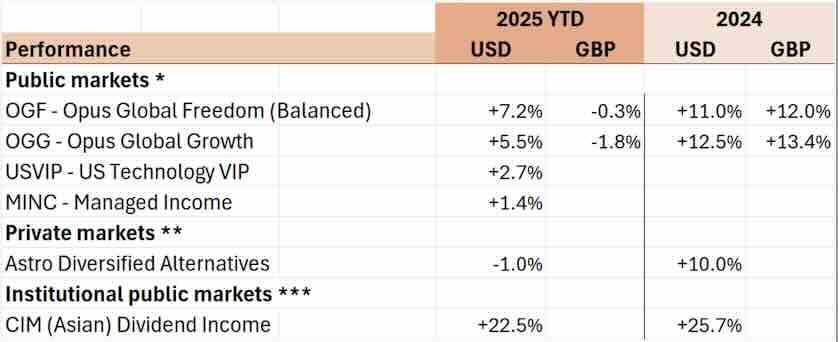
Source: * Estimates Freedom Asset Management as at 27/7/25. Please note depending upon how the funds are invested a small number of underlying funds can price 1-2 days after we take our estimates above so final published NAVs may vary. Estimated GBP returns are from a $1.25 FX rate on 31/12/24 and also launch date of USVIP 10/2/25, ** Note fund prices quarterly and includes 5% discount to NAV expressed as 5% performance above for 2024, *** FT Markets as at 27/7/25, I shares.
Please do reach out over the summer if there is anything you want to talk about. The client team is always “on”, looking out for emails and WhatsApp messages (they are all in the cc line above) - we understand that summer is often the only time you have to think through your personal investments, before the whirlwind of work starts again in September. It does not matter where we are, we will pick up those messages.
Our articles this week are from:
- Canaccord’s Justin Oliver asks: “Where next for BRICS?”
- 10,000 Days’ Cody Willard discusses “The Top 5 things we learned about building AI apps”
Please scroll down to read the articles.
This coming week I am based in Guernsey before a week of holiday in northern France.
Let me wish you a great week ahead,
Adrian
Co-Founder // Freedom Asset Management
Guernsey // Abu Dhabi // Hong Kong
M: +44 7781 40 1111* // M: +971 585 050 111 // M: +852 5205 5855* (*also WhatsApp)
--------------------------
“Where next for the BRICS”, 28/7/25
By Canaccord’s Justin Oliver, Adviser to Opus Global Growth

President Donald Trump sure seems to have it in for the BRICS (Brazil, Russia, India, China, and South Africa) — the developing world’s pitch to eclipse the Group of Seven. While Trump has railed against the bloc before, its plan to challenge the US dollar’s global dominance really has Trump World in a whirl.
Trump is threatening a 10% tariff on BRICS nations for what he terms “anti-American” manoeuvring. Last week, he singled out Brazil with a 50% levy threat. One reason: Brazil is holding former President Jair Bolsonaro accountable for his alleged involvement in his supporters’ attempted coup following his defeat in the 2022 presidential election. All this has India scrambling behind the scenes to distance itself from the BRICS’ top agenda items.
Yet Trump might be wasting his time. The BRICS is proving to be more of a paper tiger than a successor to the world order.
Take last week’s BRICS summit in Rio de Janeiro as an example. News coverage focused mostly on the absence of Chinese leader Xi Jinping. But the discussion point that could matter more is what wasn’t present: any hint of a vision for a geopolitical force supposedly on track to supplant US influence. Xi’s no-show exemplifies the problem. It suggests that China is putting less stock in the BRICS.
Without China in the room, the BRICS has significantly less swagger on the world stage.
Russian President Vladimir Putin was missing, too. The optics of one of the original BRICS members being subject to an International Criminal Court arrest warrant is its own challenge. Yet in Rio, BRICS leaders validated concerns that the bloc is struggling to succeed even in areas of shared interest. It has yet to move beyond declarations to concrete steps that alter global dynamics. One problem, critics argue, is that the long-hyped excitement over the BRICS went to the group’s collective head.
Looking back, the original BRIC acronym was coined in 2001 by Jim O’Neill, then with Goldman Sachs. O’Neill’s thesis was that these fast-growing, large-population nations would come to dominate world GDP and geopolitical influence in the not-so-distant future. In 2009, Brazil, Russia, India, and China saw fit to hold a summit meeting in Yekaterinburg, Russia.
By 2010, South Africa was added, representing the “S”. In 2023, the BRICS added six new members: Egypt, Ethiopia, Indonesia, Iran, Saudi Arabia, and the United Arab Emirates. At present, BRICS leaders represent about 40% of global GDP and 49% of the world’s population.
The BRICS isn’t stopping there, and are now taking on a constellation of “partner countries”. They include: Belarus, Bolivia, Cuba, Kazakhstan, Malaysia, Nigeria, Thailand, Uganda, Uzbekistan, and Vietnam. Yet this race to expand the group might actually be diluting its effectiveness against Western capitalism.
The core five members have yet to create anything approaching a free-trade zone. Along with decades-old border disputes, China and India are competing fiercely for influence among “Global South” nations. Russia’s invasion of Ukraine is a controversy the BRICS could do without. And Brazil and South Africa worry that BRICS expansion might dilute their power. As new members arrive, writes Mariel Ferragamo at the Council on Foreign Relations, “other major dividing lines include tensions between democracies and autocracies, and long-standing rivalries such as those between Saudi Arabia and Iran and between Egypt and Ethiopia.”
It’s become, as the Financial Times argues in a recent editorial, “a more diffuse and contradictory cluster” of nations— a giant island of misfit geopolitical toys. By some measure, the grouping is indeed having a moment. In 2024, the BRICS+ beat the global annual growth average, growing 4% by the International Monetary Fund’s (IMF) numbers. This year, the IMF reckons the bloc will collectively grow 3.4% versus the global average of 2.8%. Yet size gets the BRICS only so far. In Rio, the grouping couldn’t even muster support for mentioning the US in its communique. It danced around Trump’s trade war, US support for Israel, and the recent bombings in Iran. The reason: Individually, each BRICS member relies more on exports to Trump’s economy than they like to acknowledge. “While the BRICS countries are often perceived as a counterbalance to Western power, their economies remain linked to the United States in crucial ways,” notes Valentina Sader of the Atlantic Council.
All this suggests that the BRICS is unlikely to get its act together to threaten the dollar’s reserve-currency status, dethrone the IMF and World Bank, or even to forge a coherent intra-BRICS market that has the US looking over its shoulder. Trump might not need to do much to combat an entity that hasn’t proved it can shoot straight.
Justin Oliver
----------------------------------
“The Top 5 things we learned building AI Applications” 28/7/25
By Cody Willard, Adviser to the US Technology VIP Fund
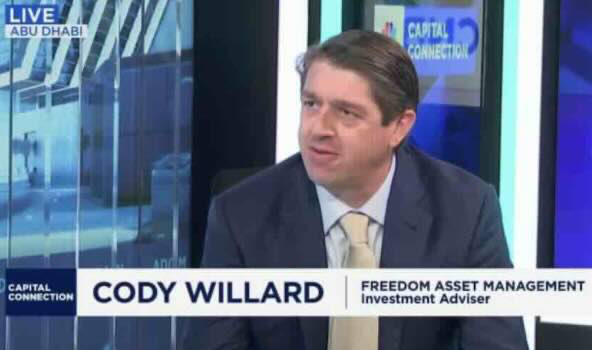
Firstly, if you missed our webinar, please see below the link:
The Top 5 things we learned building AI Applications
As we often say, we are living through the very beginning stages of The AI Revolution. And The AI Revolution isn’t just any ol’ Revolution. Rather, it will become the single biggest Revolutionary platform and will change the world’s economy and society more than anything since The Electricity Revolution from almost 200 years ago.
One thing to always remember when you’re using AI tools today is that this is the worst they will ever be. Everything about AI will only get better, easier to use, quicker, more fun, etc. from here. I often call it the “dial-up Internet phase of The AI Revolution.”
Anyway, we’ve been spending a lot of time and energy lately using AI to create tools that also use AI. Here are the Top 5 Lessons I’ve learned building AI apps.
- The Democratization Of The App Revolution.
It’s crazy to see how many ideas for little web apps you can come up with now that the bar to building them is so dang low. Among others, we’ve built a crochet club app for my daughter, a judicial AI app for my wife’s new job, an app showingaccelerating technology through time, an app to discover and share AI apps, and RevolutionInvesting.ai to showcase some of the investing-specific apps we’ve made. And yet, as easy as AI is starting to make web app creation, it’s still archaic and far from being as easy as it will be some day. Soon, we’ll be turning ideas into web apps by audibly speaking to our AIs and seeing the finished product completed in a few seconds.
- AI is a Boon, Not a Threat, to Small Business.
Everyone was worried about small business because of Walmart and Amazon, but right here, right now, The AI Revolution is helping millions of people create small businesses and will help millions of small businesses be more profitable and find new avenues of growth. The aforementioned democratization of app development, will also lead to a massive democratization of video game development, movie development, commercial development, which is more likely to bring us into a golden age of small businesses booming rather than destroying them.
- Building > Writing.
The AI Revolution is going to hurt publishers of the written word. Look, it sucks that blogs and newspaper companies are suffering because the AI answering interface is summarizing their content, and people are just not going to click through and read long-form blog and articles like they used to. The answer: build great web apps (like the ones we’ve been building). You're going to need something that provides a service to people that's more valuable than just reading a summary of your content on AI in order to get traffic to your site.
- The AI/Compute Flywheel.
We’re seeing a virtuous circle of needing more compute as ever more compute is added. Think about all the inference compute that’s required for AI to generate AI apps. And think about all the inference compute that’s required to make the AI-generated content inside those apps. And think about all the new apps and websites that are going to be using AI-generation features. And think of how lame it is that you can barely get an 8-second video from Google’s Veo 3 model and it takes several minutes for the AI to create it. And think of all the demand there will be for exponentially more compute as all this AI flywheel spins around itself.
- The AI Job Explosion.
We’re going to see more jobs created because of AI, not fewer. I’ve been preaching this point forever, but it’s worth repeating because it’s clear to me that if Bryce and I had more people that knew what they were doing with web apps and AI vibe coding that we’d be more efficient and productive and profitable in our day jobs of running funds. But if we had more people, we would build more. The more we build, the more people we need to manage and improve what we build. Another virtuous cycle?
Conclusion
The AI Revolution is keeping the economy and the broader markets steady and growing and that is likely to be the case for the foreseeable future. I have no doubt that there will be downturns and perhaps some rolling recessions in various industries if not across the broader economy while The AI Revolution is building on its own momentum over the next few years. We’ll then be entering the golden age of The Robotics Revolution and from there we will be entering the golden age of The Space Revolution. We’re sticking with our Revolutionary longs focused on this current phase of The AI Revolution like Google GOOG, Nvidia NVDA, CoreWeave CRWV, and Amazon AMZN, among others.
Cody Willard
-------------------------
If you would like to be removed from this Monday morning mail, please reply ‘unsubscribe’.
Capital at risk. For further details about any of Freedom’s investment strategies or a copy of any fund prospectus, please contact investor@freedomasset.com. Please note: The value and the income produced by strategies may fluctuate, so that an investor may get back less than initially invested. Value and income may be adversely affected by exchange rates, interest rates, or other factors. Levels and bases of taxation may change. Investors should consult their own tax advisor regarding their individual tax treatment with respect to the strategies referred to herein. This document does not represent a research report. The opinions expressed are those of the authors only, and may not be representative of, or shared by, Freedom Asset Management Limited or its affiliates. This email should not be considered to be an offering memorandum and is not an offer to sell nor a solicitation of an offer to purchase interests in any fund. Offers and sales will be made only pursuant for the current prospectus, constituent documentation and in accordance with applicable securities laws. A decision to invest in any of the funds should only be based upon review of such documents and these materials are qualified in their entirety by reference thereto.
Please note Freedom’s investment strategies are only available to Professional Investors, as determined by the relevant jurisdiction.
This message is intended solely for the addressee and may contain confidential or privileged information. If you have received this message in error, please permanently delete it and do not use, copy or disclose it. Freedom Asset Management Limited is licensed to carry on controlled investment business under the Guernsey Financial Services Commission (GFSC); Reference Number 2262946. The registered office of FreedomAsset Management Limited is: 2nd Floor, New Century House, 2 Jubilee Terrace, St Peter Port, Guernsey, GY1 1AH, Channel Islands. Freedom Asset Management (Middle East) Limited is authorised and regulated by Abu Dhabi Global Market (ADGM) Financial Services Regulatory Authority, No: 250016. The registered office address of Freedom Asset Management (Middle East) Limited is Office 2406, Tamouh Tower, Al Reem Island, Abu Dhabi Global Markets, Abu Dhabi, United Arab Emirates. Freedom Asset Management (Asia) Limited, holds a Type 9 Asset Management license from the Securities and Futures Commission in Hong Kong, Ref: BUR351. The registered office of Freedom Asset Management (Asia) Limited is Rm 97 5/Fl United Centre, 95 Queensway, Admiralty, Hong Kong.
© 2025 Freedom Asset Management Limited.

